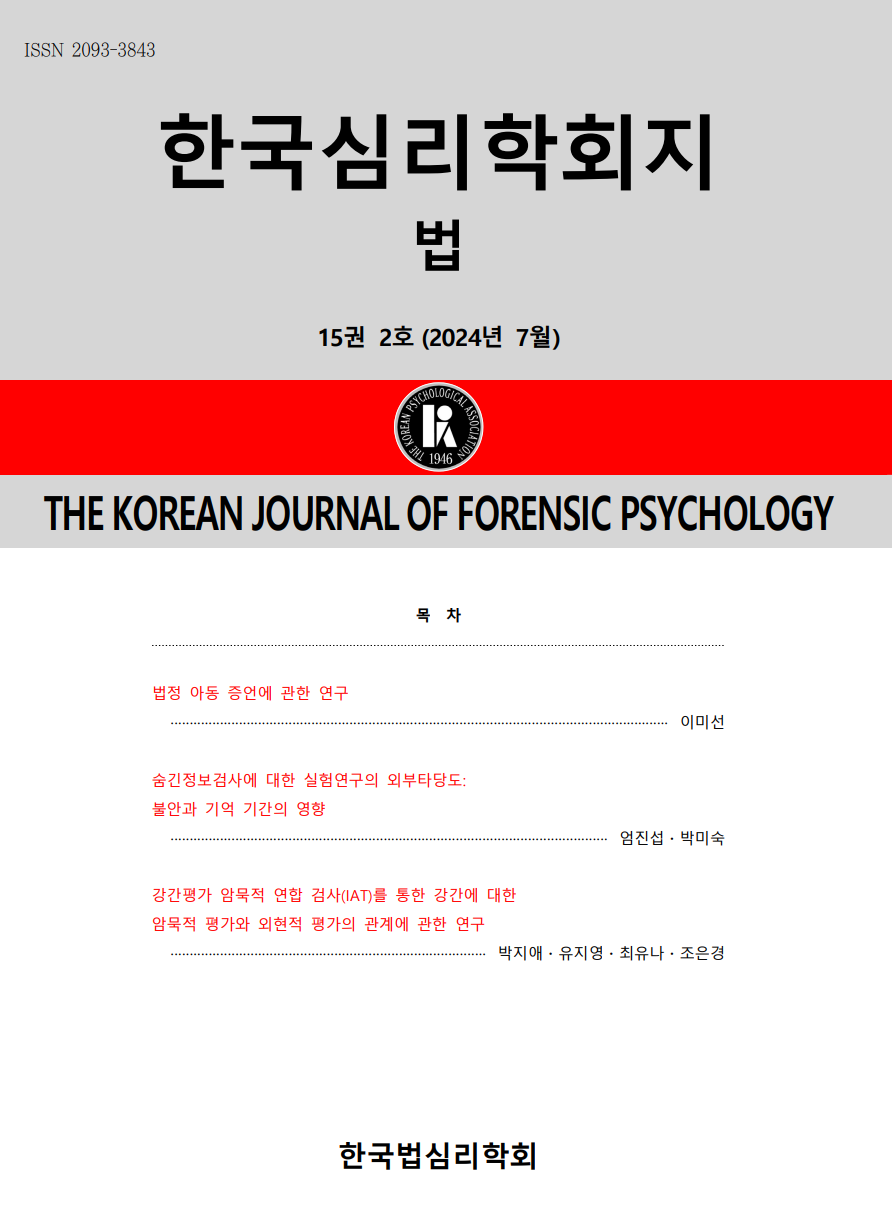 ISSN : 2093-3843
ISSN : 2093-3843
Previous studies showed that people tend to pay irrational attentions to irrecoverable past investments, called as sunk costs, while making decisions. The purpose of this study was to examine the vulnerability of Korean lawyers to sunk costs including both sunk money and sunk time. Fifty five Korean lawyers and sixty lay people completed a survey consisting of a measure of the vulnerability to sunk costs and a regret-based decision making style scale. Results indicated that lawyers exhibited the vulnerability to both sunk money and sunk time whereas lay people showed greater sunk money effects than sunk time effects. Additionally, lawyers with greater regret-based decision making styles were more vulnerable to both sunk money and sunk time compared to those who with weaker regret-based decision making tendency. Implications, limitations and possible future studies were also discussed.
This study compared the procedure of statement analysis and the present state of its utilization in Korea with those in three Western Europe countries, Germany, Sweden, and Swiss. In order to investigate the specific procedure of statement analysis and the different state of the utilization in each country, literature was reviewed and in-depth interview was conducted with each country’s experts who have been currently working in both practical/academic field of statement analysis. Generally, in the Western Europe countries, the courts have expert lists and the experts would be requested to conduct statement analysis of a witness by the court or a party of the trial. In Korea, statement analysis could be conducted in any stage of criminal procedure. In Germany and Sweden, an expert’s testimony based on his/her statement analysis for a witness is admissible to the courts, which is the most distinctive feature in comparison to the statement analysis expert’s testimony in Swiss and Korea. An expert’s opinion is regarded as only one piece of information for criminal investigation or trial. German and Swiss courts have the minimum standards for admissible expert’s report. In Sweden, there is a scientific assessment tool, Structured Quality assessment of eXpert witness testimony (SQX-12) that would allow triers of fact to assess the quality of expert report, while no such instrument or standard have developed in Korea. On the basis of the comparison, the four ways to improve the procedural validity and the utilization of statement analysis in Korea were suggested. As these suggestions would effectively strengthen the procedural validity of statement analysis and expand the utilizability of its result in Korea, it ought to be considered as significant information in the future policy making.
In criminal investigation, investigator can allocate resources efficiently and solve criminal case rapidly by means of rational decision making. This study was conducted for checking the applicability of Bayesian network for decision making in criminal investigation. Especially I wanted to check the Bayesian network’s usability and accuracy in murder case through building model for judgment whether the criminal was an acquaintance of the victim and determining the probability of being acquaintance by applying clues in crime scene. Bayesian network can help to model the relationship between evidences and informations with conditional probability, and help to calculate posterior probability after applying evidences. After modeling for judgment whether the criminal was acquaintance, the result of the posterior probability after applying evidences to Bayesian network model was equal to the result of actual investigation. This suggests that the Bayesian network can be applied for rational decision making in criminal investigation.
It is not convenient and practical for law enforcement to operate the lineup process of eyewitness identification. That is, the conveniency of law enforcement can drive to shift the requirement of urgency into that of proximity of time and space. Considering most of show-ups are made with proximity of time and space, an exceptional requirement can be changed into a principal requirement. The proximity of time and space possibly supercede not only line-up but also show-up and take up the main and majority process of eyewitness identification process. According to the scientific research results, show-up process may intensify the problems in store and reproduction of memories and cause high level of bias. Also, even though the accuracy of show-up process become lower as time goes by, it does not necessarily justify immediate show-up process. Show-up is still dangerous compared to ordinary line-up. Therefore, immediacy requirement should be replaced by urgency requirement. the inevitable condition is required, for example when a victim is close to death, when there is a circumstance that a victim cannot come to police department or detention center, when it is not proper to constitute a lineup process, or when it is necessary to determine the accuracy of arrest. In conclusion, show-up should be presumed to be an unfair process until it is proved that law enforcement made additional efforts to enhance accuracy or set aside suggestiveness of the process.